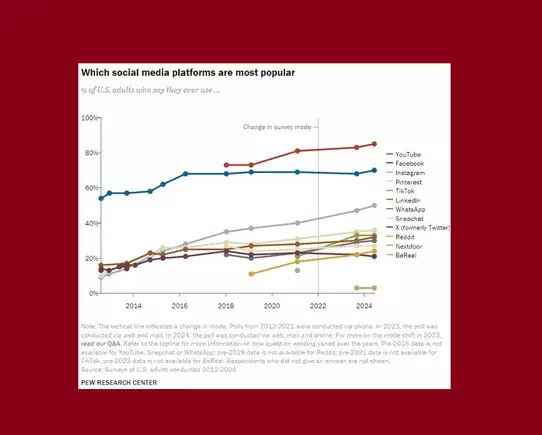The digital landscape is in a state of perpetual evolution, particularly in the realm of social media. Recent data from Pew Research offers critical insights into the latest trends influencing social media usage among U.S. adults. This analysis not only reveals the platforms that dominate but also raises the crucial question: Is X, formerly known as Twitter, losing its relevance in the ever-competitive social media environment?
The latest report demonstrates that YouTube continues to assert itself as the leading social media application. While some may debate categorizing YouTube as a social media platform due to its emphasis on content consumption rather than interaction, its impact on user engagement cannot be overlooked. Following closely behind are Facebook and Instagram, both products of Meta Platforms, Inc. The data indicates that these three remain the titans of social media, with their popularity firmly intact among U.S. adults.
The survey conducted by Pew Research, which encompassed 5,626 U.S. adults between February and June of this year, highlights significant usage patterns. YouTube and Facebook are explicitly identified as the most frequently utilized platforms, with Instagram coming in as a close contender. This trend underscores a clear hierarchy in platform usage that has persisted since at least 2018. These platforms, particularly YouTube and Facebook, seem to exhibit a resilience that may defy the volatile trends typically observed in social media popularity.
While raw numbers on user numbers are invaluable, understanding user engagement is essential for evaluating a platform’s true relevance. Although TikTok has gained immense traction, particularly among younger demographics, Pew’s findings suggest that TikTok’s usage has plateaued over the past year. This stasis could indicate that despite its former meteoric rise, TikTok may be struggling to maintain a growing user base, unlike platforms such as Pinterest, which has seen a resurgence in engagement.
Furthermore, additional platforms like LinkedIn and WhatsApp have experienced modest growth, and Reddit has also maintained steady interest among users. In contrast, Snapchat’s usage remains stable, lacking the explosive growth that has characterized other platforms. Such variations in user engagement signal differentiated experiences across these platforms, opening avenues for brands to tailor their strategies based on where their audiences are spending their time.
Amid these trends, the plight of X becomes increasingly storied. Data indicates that X has witnessed a slight decline in user engagement, though not as drastic as some analysts anticipated. This suggests that while the platform may be facing challenges, it is not yet in freefall. Understanding the factors contributing to this decline is crucial; a changing user base, evolving content consumption habits, and a shifting competitive landscape all play a role.
The demographics of social media users reveal telling insights. Facebook still holds significant sway among older users, while TikTok and Snapchat have captivated younger audiences. This generational divide presents an intriguing narrative that brands must navigate thoughtfully. With YouTube cutting across age groups with a variety of content, including educational videos, entertainment, and lifestyle, it remains a preferred platform for many.
As we analyze these findings, it becomes apparent that social media trends are not just a reflection of popularity but rather an intricate interplay of audience engagement, content consumption habits, and demographic targeting. For brands and marketers looking to refine their social media strategies for 2025 and beyond, it is essential to grasp where audiences are active and how these trends can inform content creation and distribution methods.
The current state of social media illustrates a complex and multifaceted world. With ongoing developments, understanding the nuances of user engagement, demographic shifts, and platform relevance will remain vital for anyone keen on leveraging social media effectively. As platforms evolve, so must strategies—ensuring that they resonate with the audience’s preferences and behaviors in an ever-changing digital sphere.

